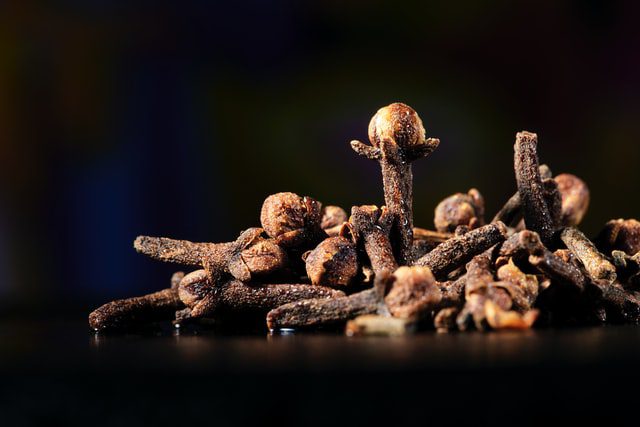Uses
Natural Medicines Comprehensive Database rates effectiveness based on scientific evidence according to the following scale: Effective, Likely Effective, Possibly Effective, Possibly Ineffective, Likely Ineffective, Ineffective, and Insufficient Evidence to Rate. The effectiveness ratings for CLOVE are as follows:
Insufficient evidence to rate effectiveness for…
- Small tears in the lining of the anus (anal fissures). Early research shows that applying a clove oil cream to anal tears for 6 weeks improves healing compared to using stool softeners and applying lidocaine cream.
- Tooth plaque. Early research shows that using a toothpaste or mouth rinse containing clove and other ingredients helps to reduce plaque on the teeth.
- Hangover. Early research shows that taking an extract from the flower buds right before drinking alcohol improves hangover symptoms in some people.
- Excessive sweating (hyperhidrosis). Early research shows that applying clove oil to the palms for 2 weeks helps reduce excessive sweating of the palms.
- Mosquito repellent. Early research shows that applying clove oil or an oil gel directly to the skin can repel mosquitos for up to 5 hours.
- Pain. Early research shows that applying a gel containing ground cloves for 5 minutes before being stuck with a needle can reduce needle stick pain.
- Prediabetes. Early research in people with prediabetes shows that taking an extract from the flower buds seems to lower blood sugar levels before and after a meal. However, this study didn’t include a control group, so the true effects of clove on blood sugar are not clear.
- Itching. Early research shows that putting a solution containing clove oil gel on the skin can help with severe itching.
- Toothache. The oil and eugenol, one of the chemicals it contains, have long been applied to the teeth and gums for toothache, but the U.S. Food and Drug Administration (FDA) has reclassified eugenol, downgrading its effectiveness rating. The FDA now believes there is not enough evidence to rate eugenol as effective for toothache pain.
- A mild form of gum disease (gingivitis).
- Bad breath.
- Cough.
- Diarrhea.
- Dry socket (alveolar osteitis).
- Gas (flatulence).
- Early orgasm in men (premature ejaculation).
- Indigestion (dyspepsia).
- Nausea and vomiting.
- Swelling (inflammation) and sores inside the mouth (oral mucositis).
Other conditions.
More evidence is needed to rate the effectiveness of clove for these uses.
Side Effects Of Clove
- When taken by mouth: Clove is LIKELY SAFE for most people when taken by mouth in amounts commonly found in food. There isn’t enough reliable information to know if taking it in larger medicinal amounts is safe or what the side effects might be.
- When applied to the skin: Clove oil or cream containing the flower is POSSIBLY SAFE when applied directly to the skin. However, the application of clove oil in the mouth or on the gums can sometimes cause damage to the gums, tooth pulp, skin, and mucous membranes. Application of clove oil or cream to the skin can sometimes cause burning and irritation of the skin.
- When inhaled: Inhaling smoke from clove cigarettes is LIKELY UNSAFE and can cause side effects such as breathing problems and lung disease.
- When given by IV: Injecting the oil into the veins is LIKELY UNSAFE and can cause side effects such as breathing problems and lung disease.
Warnings & Precautions
- Children: In children, clove oil is LIKELY UNSAFE to take by mouth. It can cause severe side effects such as seizures, liver damage, and fluid imbalances.
- Pregnancy and breast-feeding: Clove is LIKELY SAFE when taken by mouth in amounts commonly found in food. There isn’t enough reliable information to know if clove is safe to use in larger medicinal amounts when pregnant or breast-feeding. Stay on the safe side and stick to food amounts.
- Bleeding disorders: Clove oil contains a chemical called eugenol that seems to slow blood clotting. There is a concern that taking clove oil might cause bleeding in people with bleeding disorders.
- Diabetes: Clove contains chemicals that might affect blood sugar levels in people with diabetes. Watch for signs of low blood sugar (hypoglycemia) and monitor your blood sugar closely if you have diabetes and take clove.
- Surgery: Cloves contain chemicals that might affect blood sugar levels and slow blood clotting. There is a concern that it might interfere with blood sugar control or cause bleeding during or after surgery. Stop using clove at least 2 weeks before a scheduled surgery.
Clove Dosage
The appropriate dose depends on several factors such as the user’s age, health, and several other conditions. At this time there is not enough scientific information to determine an appropriate range of doses for clove. Keep in mind that natural products are not always necessarily safe and dosages can be important. Be sure to follow relevant directions on product labels and consult your pharmacist or physician or other healthcare professional before using.
Other
Consult your doctor or pharmacist.
Source
All information has been provided courtesy of MedLinePlus from the National Library of Medicine and from the FDA.



